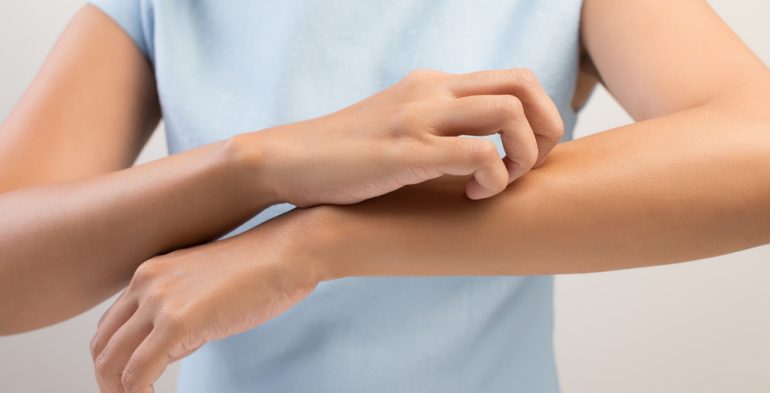
Pregnancy Eczema
If you have suffered from eczema at any time in your life pre-pregnancy you have a good chance that your eczema will return at this time or become worse; and if you have rarely or never suffered form eczema prior to pregnancy, this is the time it may make its first appearance! Atopic eczema is an hereditary condition running in families so if you have family members who suffer you are more likely to. Whilst often triggered by contact with allergens such as dust, pet dander, household cleaning products or plants, pregnancy hormones may well make you more sensitive to these triggers which is why symptoms can become worse whilst expecting a baby.
Symptoms of pregnancy eczema, or any atopic eczema, can range from mild to quite severe, and are always unwelcome. Patches of itchy and sometimes sore and flaky skin commonly on the wrists, elbows, backs of knees and hands (but it can appear anywhere) flare up and scratching can lead in more severe cases to cracked and bleeding skin which in turn can lead to risk of infection.
Prescribed treatment of eczema is available from your doctor in various forms of creams and lotions, and in pregnancy it is important to make sure whatever treatment you use topically is suitable for pregnancy whether prescribed or available over the counter from your pharmacist.
What can I do to help manage my pregnancy eczema?
There are plenty of things you can do to help ease the symptoms of your eczema and to help avoid triggers or further flare ups. As your eczema is as individual as you are you will need to experiment a little and find what works best for you.
- Keep your skin hydrated: Choose a cream or lotion specifically formulated for dry and eczema prone skin. There are also preparations you can add to your bath which will relieve and moisturize dry and irritated skin.
- Avoid scented soaps and bath cosmetics: Soap will dry your skin and perfumed products can irritate further. Use an emollient cleanser specifically designed for dry skin. Water also dry the skin so keeping bathing to a minimum during flare-ups of the condition is sensible.
- Avoid known triggers: If you can ascertain certain chemicals or situations which exacerbate your eczema such as washing up products, laundry detergents or dust try to avoid. Wearing gloves for household cleaning is sensible.
- Try not to scratch! However irritating the itch of eczema is it will only worsen with scratching. Keep your nails short. Breaking the skin will make the area sore, unsightly and prone to infection. Gently pressing on the area or using a cold compress can help relieve the itch without risking further irritation or damage to the skin.
- Medical help: Although you can buy various products from your pharmacist to help with eczema it is wise to consult your doctor for eczema in pregnancy. You may be prescribed topical steroids of a strength to meet the needs of your condition or in severe cases an oral steroids may be prescribed however this is less likely in pregnancy.
The good news is that pregnancy related eczema will be likely to disappear or become less problematical once your baby is delivered. If you have not experienced skin irritation before your pregnancy or you notice an existing eczema appearing in places unusual for you or if you are concerned in any way it is important to seek a medical opinion to rule out other causes.









